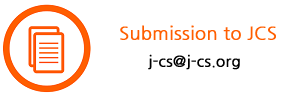The Journal of Cognitive Science (JCS) is committed to establishing clear expectations and criteria for all principals involved in the submission, review, and publication process. The process of publication requires the author, reviewer, and editor to clearly understand and act within the expectations set forth by JCS to ensure that accurate and ethical information appears in each article published by the journal and that any studies involving human or animal subjects conform to national, local and institutional laws and requirements (e.g. WMA Declaration of Helsinki, NIH Policy on Use of Laboratory Animals, EU Directive on Use of Animals) and confirm that approval has been sought and obtained where appropriate.
Outlined below is a detailed summary of our expectations for authors, reviewers, and editors:
ETHICAL EXPECTATIONS
1.Authors
In order to be considered for publication, authors must:
•provide a complete list of A) references at the end of their article and B) financial support for their research;
•deliver original, plagiarism-free content and data that is in no way fraudulent;
•keep accurate records of data related to their submission, provide access on reasonable request, and to inform the journal editor of any significant updates to this data;
•obtain express permission from human subjects where necessary and respect their privacy;
•not have published and agree not to publish the same research in additional journals.
Additionally, all authors are required to: •agree to participate in the peer review process;
•have significantly contributed to the research undertaken in composing the article;
•provide a statement that all data in the article is real and authentic;
•notify the journal editor promptly if an error is identified in their research data;
•provide retractions or corrections of mistakes should they be found.
Finally, studies on humans or animals that involve experiments require approval from an ethics committee such as IRB (Institutional Review Board) and the papers should document it.
2.Reviewers’ responsibilities are to:
•review all work by the assigned deadline;
•remain objective during the review process;
•have no conflict of interest with respect to the research, the authors, the funding of research, or any other aspects of the article that may lead to a less than objective assessment,
and if they believe a potential conflict to exist to alert the editors and/or withdraw their services for that article;
•indicate any published work relevant to the submitted article which is not cited in the submission;
•inform editors in the event evidence of unethical behavior is found;
•provide a reasonable explanation to editors if they will no longer be able to work as a reviewer;
•treat all submissions and their contents confidentially and not retain or copy the manuscript.
3.Editors:
•must remain unprejudiced during the review process and uphold the spirit of JCS to never discriminate against any submitted paper on grounds of gender, nation, alma mater, ethnic, or geographical origin of the author(s);
•should have no conflict of interest with respect to articles they accept or reject;
•should accept an article only when reasonably certain of the quality and authenticity of said article;
•have complete responsibility and authority regarding rejection or acceptance of articles;
•should promote publication of correction(s) or retraction(s) in the event errors are found;
•should allow for the author(s) to respond in the event of a complaint;
•should respond to author requests and complaints in a timely manner;
•must preserve the anonymity of reviewers.
PROCEDURES FOR DEALING WITH UNETHICAL BEHAVIOUR
The person informing the editor or publisher of alleged unethical behavior should provide sufficient evidence and any other pertinent information to justify their suspicions as reasonable and allow for further investigation to be undertaken by the editors.
After discussion between editors, an initial decision will be made. In the event unethical behavior is determined and is of a significant degree of severity, JCS will provide a formal written warning to authors or reviewers whose actions were deemed unethical while also reserving the right to notify the head of their respective department(s) of the action.
If necessary, a formal retraction or withdrawal of a publication from the journal and imposition of sanction on authors or reviewers prohibiting submission of manuscripts to the journal for a fixed period may be required.
Copyright
Copyright on all articles published in the Journal of Cognitive Science is reserved by the Institute for Cognitive Science at Seoul National University. Authors are free to reuse their articles in subsequent publications, provided that the Journal of Cognitive Science is acknowledged as the original place of publication.
The Journal of Cognitive Science will not give permission to a third party to reproduce a published article without the consent of the authors.

